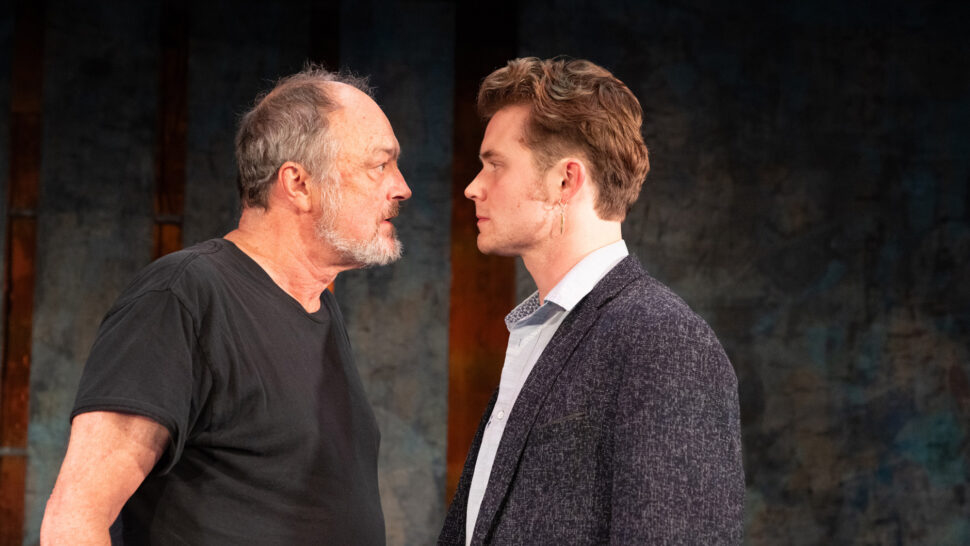FATHERLAND
Conceived and Directed by Stephen Sachs
New York City Center Stage II
Official Website
Reviewed by David Spencer
There’s a lot to be said for docu-drama plays whose primary or entire dialogue is culled from actual recorded evidence (recorded meaning via print and/or electronic media). Tone and treatment are, of course, everything, and there’s no one-size-fits-all approach. Even in the service of assiduous verisimilitude, an actor’s performance will almost always be more insistent, shaded—affect geared toward effect—than the real-life individuals being portrayed. Which is natural and unavoidable. Which can be both good and bad. This even extends to famous historical figures, though that veers into a detour I’ll resist here.
But the characters in Fatherland are not famous public personalities. There’s no obligation to replicate behavioral or vocal aspects of them. Which means that any talented, appropriately cast actors can assay them as natural extensions of their own palate, without the audience feeling the disjunct of: that doesn’t seem like [insert famous name here].
Believability thus comes down to what the play and production are trying to achieve. In the case of Fatherland, conceived and directed by Stephen Sachs, it’s to dramatize how the current political polarization can divide not only a nation and its communities, but its very families; immediate families. In this case, we have a college-age son of somewhat liberal leanings (Patrick Keleher)and an extreme-MAGA conservative father (Ron Bottitta). Nursing firearms. Compounding all this…Dad is one of the rioters who stormed the capitol on January 6th. Conspicuously. On film. He’s becoming more volatile by the day…And his son, seeing no choice, turns him in to the FBI.
The play is comprised of testimony and investigation-interrogation transcripts, constructed in such a way that the witness on the stand evokes a flashback of described events. Many will find, as many have found, this compelling, because what’s being told is an inherently melodramatic and tragic true story. But what kept pulling me out of it—and my companion of the evening too—is that there’s a certain unintentional mendacity in the presentation as well.
First of all, the actors portraying the attorneys for defense and prosecution are constantly showboating to the audience. What’s the difference between that and, say, a historical courtroom scene you might encounter in Judgment at Nuremburg or Inherit the Wind? It’s hard to articulate as a scientific principle, but you know it when you see it, and it’s approximately this: authenticity of intent and focus; behavior that, wherever in the gamut from low key to extreme, seems credible in context. A tell that we’re unmistakably in the land of gesture over verisimilitude is that Anna Khaja, as the district attorney, seems to be consciously—as well as expertly—channeling the voice and mannerisms of Kamala Harris. I say seems because the play made its regional debut well before Ms. Harris succeeded Joe Biden to head the Democratic ticket; the (apparent?) choice may have been arrived at with subtler intent. And one can’t expect her to alter her by-now fully internalized performance because of a current events coincidence. But whatever may have once been gained by this homage now comes at the cost of verisimilitude, because Ms. Khaja, though she does an awfully good Kamala Harris is still doing Kamala Harris. (I think, anyway. I’m open to the possibility that her instrument in this context is just that similar…but if so: wow.) The play’s courtroom energy commensurately bleeds into its flashback energy such that there’s little tonal distinction between them.. (Her opposite number, the prosecuting attorney of Larry Poindexter, evokes no equivalent public figure.)
This makes the re-enactments—the son’s increasing alarm, the father’s escalating rage—have less gut-punch because—let’s face it—the conflict being dramatized is not that surprising; our news consumption is suffused with it. I hasten to add, the actors are quite talented; directed differently, they could easily have delivered a more nuanced and subtle interpretation. But as currently delivered, the play never quite manages what some of us call “the 1776 trick”: maintaining long-game suspense about the real-life outcome we already know. There’s tension, no mistake; nothing about the evening is dull. But I was constantly aware of actors and a director at work.
To be fair, I reiterate that there are indeed audiences who have found the production to be compelling, in its current NYC and previous regional engagements. Will you as well? That depends upon whether you can suspend enough disbelief toward the affect to buy into the desired effect.
I was not a convert. Your mileage may vary.
